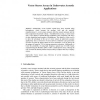Free Online Productivity Tools
i2Speak
i2Symbol
i2OCR
iTex2Img
iWeb2Print
iWeb2Shot
i2Type
iPdf2Split
iPdf2Merge
i2Bopomofo
i2Arabic
i2Style
i2Image
i2PDF
iLatex2Rtf
Sci2ools
IFIP
2010
Springer
2010
Springer
Vector Sensor Arrays in Underwater Acoustic Applications
Traditionally, ocean acoustic signals have been acquired using hydrophones, which measure the pressure field and are typically omnidirectional. A vector sensor measures both the acoustic pressure and the three components of particle velocity. Assembled into an array, a vector sensor array (VSA) improves spatial filtering capabilities when compared with arrays of same length and same number of hydrophones. The objective of this work is to show the advantage of the use of vector sensors in underwater acoustic applications such as direction of arrival (DOA) estimation and geoacoustic inversion. Beyond the improvements in DOA estimation, it will be shown the advantages of using the VSA in bottom parameters estimation. Additionally, is tested the possibility of using high frequency signals (say 8-14 kHz band), acquired during the MakaiEx 2005, to allow a small aperture array, reducing the cost of actual sub-bottom profilers and providing a compact and easy-to-deploy system.
Related Content
| Added | 19 Jul 2010 |
| Updated | 19 Jul 2010 |
| Type | Conference |
| Year | 2010 |
| Where | IFIP |
| Authors | Paulo Santos, Paulo Felisberto, Sérgio M. Jesus |
Comments (0)

